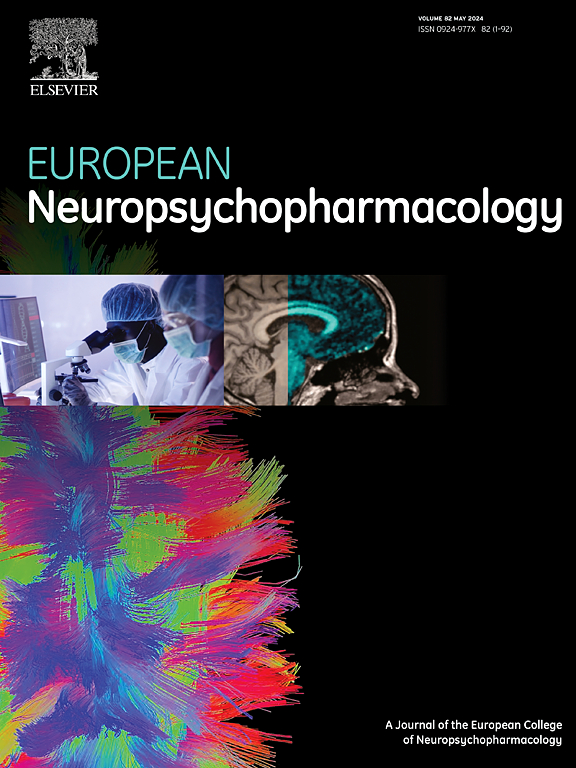全表观基因组关联研究发现焦虑的新表观遗传特征
IF 6.7
2区 医学
Q1 CLINICAL NEUROLOGY
引用次数: 0
摘要
焦虑症是一种非常普遍的公共卫生负担,严重损害日常功能并降低生活质量。虽然它们是适度遗传的,但环境因素也有影响,并可能与遗传相互作用,从而导致焦虑障碍的风险。越来越多的研究表明,DNA甲基化可能发挥作用,因为它涉及对不断变化的环境的关键适应,因此可能通过引发对环境诱因的适应不良反应而增加患焦虑症的风险。最近对焦虑症的全表观基因组关联研究的系统回顾发现,研究中没有重叠的DNA甲基化位点,这可能是由于个体研究的样本量小。在这里,我们的目标是通过结合现有研究的数据来克服这一限制。作为精神病学基因组学联盟焦虑表观遗传学工作组,我们将对迄今为止焦虑症表观基因组关联研究进行最大的横断面荟萃分析,涉及来自12个队列的18,434名参与者(3,577例焦虑病例和14,857例对照)。使用Illumina HumanMethylation 450或MethylationEPIC (850K) Beadchips或基于富集的测序方法检测血液中的DNA甲基化。在每个队列中,DNA甲基化将根据焦虑病例状态、性别、年龄、估计血细胞比例、血统、吸烟和任何特定队列的合并症(如抑郁症)进行回归。将进行反方差加权元分析。初步分析将集中于当前临床评估的焦虑障碍诊断(即,至少有一种当前焦虑障碍诊断的病例),而复制工作将检查自我报告的焦虑诊断。二级分析将侧重于识别特定于个体焦虑症的甲基化位点,例如,恐慌症可能具有与特定恐惧症等恐惧相关疾病不同的甲基化特征。初步结果确定了28个与焦虑病例状态显著相关的位点(p < 9.0 × 10-08)。最重要的发现位于PFKP,它是糖酵解的关键调节因子,它可能通过改变参与情绪调节的大脑区域的葡萄糖代谢来影响焦虑。主要发现的特征表明细胞应激反应系统以及免疫和炎症途径的潜在失调。复制工作和疾病特异性分析正在进行中。虽然还需要进一步的工作,但我们的初步结果表明,DNA甲基化是研究焦虑研究中生物学机制的一种有希望的方法。本文章由计算机程序翻译,如有差异,请以英文原文为准。
EPIGENOME-WIDE ASSOCIATION STUDIES IDENTIFY NOVEL EPIGENETIC SIGNATURES OF ANXIETY
Anxiety disorders are a highly prevalent public health burden that significantly impair daily functioning and decrease quality of life. While they are moderately heritable, environmental factors also contribute and may interact with genetics to confer risk for anxiety disorders. A growing body of research suggests that DNA methylation may play a role as it is involved in critical adaptations to changing environments and thus may confer risk for anxiety disorders by invoking a maladaptive response to environmental triggers. A recent systematic review of epigenome-wide association studies of anxiety disorders found no overlapping DNA methylation sites across studies, which is likely due to small sample sizes in individual studies. Here, we aim to overcome this limitation by combining data from existing studies.
As the Psychiatric Genomics Consortium Anxiety Epigenetics Workgroup, we will conduct the largest cross-sectional meta-analysis of epigenome-wide association studies of anxiety disorders to date, involving over 18,434 participants (3,577 anxiety cases and 14,857 controls) from 12 cohorts. DNA methylation was assayed from blood using Illumina HumanMethylation 450 or MethylationEPIC (850K) Beadchips, or enrichment-based sequencing approaches. Within each cohort, DNA methylation will be regressed on anxiety case status, sex, age, estimated blood cell proportions, ancestry, smoking, and any cohort-specific comorbidities (e.g., depression). An inverse variance-weighted meta-analysis will be performed. Primary analyses will focus on current clinically assessed anxiety disorder diagnoses (i.e., cases had at least one current anxiety disorder diagnosis), while replication efforts will examine self-reported anxiety diagnoses. Secondary analyses will focus on identifying methylation sites specific to individual anxiety disorders as, for example, panic disorder may have different methylation signatures than fear-related disorders like specific phobias.
Preliminary results identified 28 sites significantly associated with anxiety case status (p < 9.0 × 10-08). The top finding was located in PFKP, a key regulator of glycolysis, which may impact anxiety by altering glucose metabolism in brain regions involved in emotion regulation. Characterization of top findings suggested potential dysregulation of cellular stress response systems as well as immune and inflammatory pathways. Replication efforts and disorder-specific analyses are ongoing. Although further work is needed, our preliminary results suggest DNA methylation as a promising approach to study biological mechanisms in anxiety research.
求助全文
通过发布文献求助,成功后即可免费获取论文全文。
去求助
来源期刊

European Neuropsychopharmacology
医学-精神病学
CiteScore
10.30
自引率
5.40%
发文量
730
审稿时长
41 days
期刊介绍:
European Neuropsychopharmacology is the official publication of the European College of Neuropsychopharmacology (ECNP). In accordance with the mission of the College, the journal focuses on clinical and basic science contributions that advance our understanding of brain function and human behaviour and enable translation into improved treatments and enhanced public health impact in psychiatry. Recent years have been characterized by exciting advances in basic knowledge and available experimental techniques in neuroscience and genomics. However, clinical translation of these findings has not been as rapid. The journal aims to narrow this gap by promoting findings that are expected to have a major impact on both our understanding of the biological bases of mental disorders and the development and improvement of treatments, ideally paving the way for prevention and recovery.
 求助内容:
求助内容: 应助结果提醒方式:
应助结果提醒方式:


